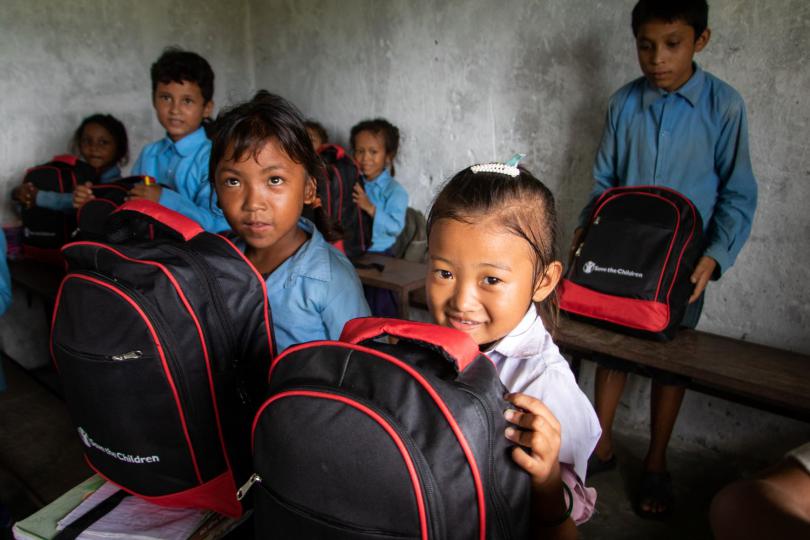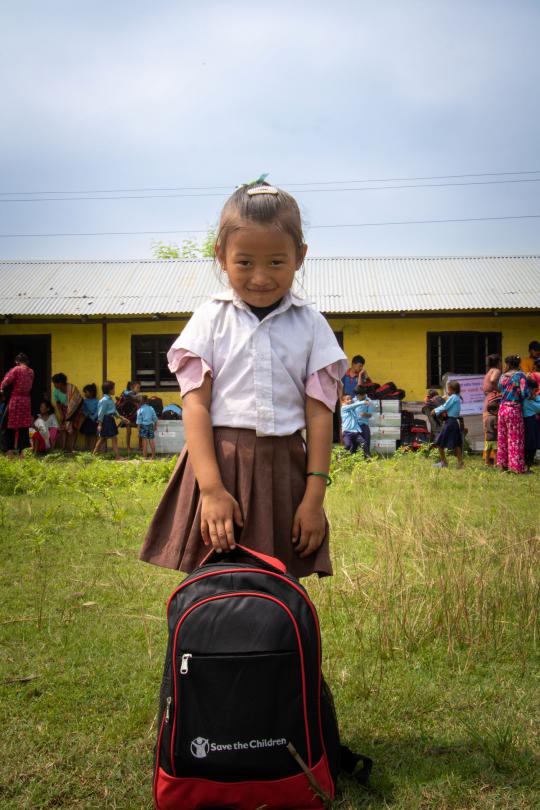LITTLE KASBI LIKES HER SCHOOL BAG

Kasbi loves going to school. She lives with her parents, grandmother, uncle, and aunt. Her family’s main occupation is agriculture. Her father Tibbat is looking to go for a foreign employment as what they earn in the village is not enough for the family of six. Kasbi’s mother Anjala used to work in the farm and looks after the household chores. But, as she is pregnant now, she does not work in the farm. Kasbi’s school is far. Tibbat is responsible to take her to the school these days. “Her father drops and picks her up from school on his cycle, says Anjala. “I will not be able to do the same when he leaves for another country as I cannot ride the cycle during pregnancy. I am afraid this might hamper Kasbi’s studies,” she adds.
One of Anjala’s sisters teaches in Kasbi’s school and Anjala thinks she can request her to take Kasbi along when her father goes for the foreign employment. “As a child I always liked going to the school and studying and Kasbi has similar traits. She loves going to the school and I want to make sure she does not have to miss her studies because of us,” Anjala shares. Kasbi insists on going to the school even on Saturdays as she loves the lunch provided in the school. Many community schools in Nepal provide mid-day meal to their students. This is an incentive from the government to encourage children to come to the school. “We had to leave home for 15 days when the flood entered the house. We stayed with a relative. As we could not take any reading materials for Kasbi, it was difficult for us to engage her,” says Anjala.

Their family has enough land for cultivation. The crops they would grow on the land would be enough for Anjala’s family and her husband’s family for a year. “Both the families used to depend on the land for food. This year, the flood damaged the paddy. Now, there’s no way but to look for additional work so that we can buy food,” she shares. “I am glad that we at least do not need to buy uniform and school essentials for Kasbi for some time as we are short on money and we need to be extra careful and save money as we have lost a lot of crops this year,” adds Anjala.
Kasbi is happy that she has a lot of items inside the bag. “I liked the handkerchief, the yellow one the most,” she says. “But I also liked the copies and pencils,” she adds. Kasbi wants to draw a flower in the copy.
About the response:
During monsoon (of 2022) the Saptakoshi river has been eroding its western embankment in the Dumribote area of Belaka Municipality-8, Udayapur. Locals have started leaving the settlements fearing floods and inundation. The river’s course has been shifting west for the past few years, putting the nearby settlements of Udayapur and Saptari districts at high risk. The river entered the settlement through the Dumribote area early morning (at around 4 a.m.) on 3 August 2022, affecting more than 1,500 families of ward number 1, 2, 3, 8, 9 of Belaka Municipality of Udayapur and 1000 families in Sunsari Barah ward no. 6 and 9.

Save the Children supported over 80 families living in temporary evacuation shelters with hygiene kit, dignity kit, mosquito nets and baby packs in Udayapur, in coordination with local government and the local partner Child Development Center. In total, we have supported 7 schools with 7 school and recreational kit, 110 children with ECCD Kit, 403 children with Student Kit, 26 teachers with Teacher’s Kit, 7 ECCD centres with ECD kit. Save the Children coordinated with the local government for data collection and needs assessment for the response. Based on the assessment report, the education and school kits were distributed in the schools affected by the flood and the coordination work is ongoing for the establishment of temporary learning centers in the affected area.
